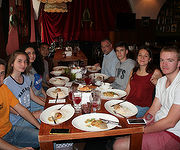Cherie Blair offers legal help to human rights groups in Russia
ST. PETERSBURG, Russia, July 17 Cherie Blair, the wife of Prime Minister Tony Blair of Britain, on Monday stepped into the debate over Kremlin pressures on Russian civil society, offering legal assistance to human rights and aid groups to challenge a disputed new law, members of the organizations said.
The offer by Ms. Blair, a human rights lawyer, came at the end of the Group of 8 summit meeting here, during which President Bush and Mr. Blair tried to balance their shared interests with Russia and their concerns over President Vladimir V. Putins authoritarian tilt.
Earlier this year, Mr. Putin signed a law requiring private groups, commonly referred to as nongovernmental organizations, or N.G.O.s, to re-register and forbidding their use of foreign money for political activities.
Ms. Blair made the offer while meeting privately here with several of the organizations, which cheered her for expressing her support.
Two participants in the meeting said that Ms. Blair told them British lawyers could offer assistance in appeals to the European Court of Human Rights and that she seemed sincere in her concerns.
It was a symbolic gesture, and I think she really managed to get across that it was a matter of heart for her, said Hanno Gundert, director of the German-Russian Exchange in St. Petersburg, which organizes exchange programs for young teachers, social workers, journalists and other professionals.
Dezire Deffo, the vice president of the African Union, a local organization, said Ms. Blair told the groups that she had not yet read the law but that she planned to do so, saying she was ready to assist with legal advice. She said, I am prepared to help you if you need it, Ms. Deffo said.
Mr. Putin has said the groups sometimes serve as a cover for foreign intelligence activities and should not be allowed to influence Russias politics.
The organizations say that the accusation is groundless and that the law, which has created onerous new filing responsibilities, appears to provide a pretext for shutting down groups that the Kremlin deems a political threat.
Several Western nations and organizations have expressed concern that the law reflects a step back from Russias public commitments to become more democratic.
The law is just beginning to be put into effect, and the organizations are waiting to see how it will be enforced and deliberating about whether they should mount legal challenges against it either in Russia or in Europe.
Carl Gershman, president of the National Endowment for Democracy, an American-financed private group that provides grants to promote and strengthen democratic institutions in other nations, said in an interview last week that for the moment the groups the endowment supports are watching for the Kremlins next step.
We are very worried, he said. If indeed they are going to move aggressively on this law, and they try to shut down these N.G.O.s, then they will have crossed the line.
President Bush also met with civil society leaders when he arrived here last Friday, telling them he would bring up their problems during his private meetings with Mr. Putin.
Mr. Gundert said the public support by Western political figures is an encouraging sign. It is very important to show that the situation is being observed by the international community, he said. The law has been passed, and now people are interested in seeing what it will look like in reality.
Mr. Putin, in his own meetings with civil society leaders, said he, too, would review the law.
By C. J. CHIVERS
 EDUCA Russian Language Center
EDUCA Russian Language Center
 Underwood Art Hotel
Underwood Art Hotel